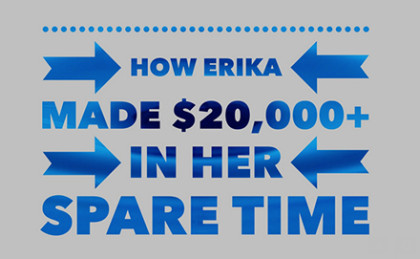
You can summarize the answer to almost every financial problem in two words: Earn more.
Snag extra work on the side. Save every dime of this extra income. (After all, you don’t “need” the money. You’re already living fine without it.)
Boom — you’ve instantly super-charged your savings.
When I wrote that, a few readers said: “Sounds great in theory. Let’s see it in practice.”
Touché. Let me introduce you to Erika, who earned an extra $20,000+ in her spare time last year — while working full-time and attending graduate school.
****
Erika is a typical American. She lives in Orange County, California — the “home of the Real OC,” she describes.
She has a traditional, 9-to-5 day job in an office. Last March, she enrolled at California State University and began pursuing her Masters in Public Administration.
Her husband is an emergency medical technician, or EMT, who advanced to the level of firefighter this month. They married three years ago, and “the first couple of years (of our marriage) were REALLY hard financially,” she says.
Typical storyline, right? Office worker and EMT/firefighter fall in love, get married and struggle financially. We’ve heard stories like this a million times.
But Erika’s story takes an unusual twist.
The “normal majority” would either:
- Resign themselves to a low-income fate;
- Rely solely on the hope of a raise/promotion;
- Bury themselves in credit card debt, then convince themselves that “being in debt is normal.”
But Erika is a rebel. She chose a different path. She devoted every spare hour to hustling for extra money.
She started with small wins:
“We held a garage sale, and made like $100 bucks or something,” she says. “And then (I tried) mystery shopping. The money was paltry, but I was willing to try everything.”
Then she expanded into freelance writing:
“I looked for writing jobs on Craigslist. A lot of people need writers for their small businesses, but just don’t have the budget for big PR companies. This was my target. I ended up working for some start-up companies, as well as religious organizations. I even managed social media accounts.”
Notice her strategy — she defined a target client profile. Then she began visiting the forums where that type of customer hangs out. That’s savvy.
And she didn’t sell herself short.
“I never bothered with Odesk and eLance,” she says, “because I knew I could not compete (with low-paid workers based overseas.) I did not want to work for $2 an hour … I set a standard and I never worked for free.”
She snagged her first small once-a-week writing job. Then she found another one. And another one.
“It’s not like I get a deluge of freelance offers everyday — I would say more like one every couple of months or so — but I hold onto those relationships and build more,” she says. “I’ve also been referred by people I currently work for, and that has led to more opportunities as well.”
One of her clients asked her to become the Content Manager for their website. This now accounts for between 30 – 50 percent of her side income.
She also began monetizing her blog, and advertising on her website accounts for another 50 percent of her income.
How did her results grow?
- In 2011, she earned $1,820 in extra money.
- In 2012, she earned $10,566 in extra money.
- In 2013, she earned $20,000+ in extra money.
Her hourly rate, she says, is around $25 – $35 per hour. She celebrated a major milestone last year, when her “side income” topped $20,000.
“It is SO unreal to me that I was able to pull this off this past year,” she says. “I am just a regular, normal person. I work a full-time 7:30 am to 5 pm job, I go to graduate school full-time, and I bust my butt on weekends and nights to freelance.”
Wait — when does she find the time to work this hard?
“I’m in an accelerated program through California State University that is designed for full-time working professionals,” she says. “I attend class on Saturday mornings twice every six weeks on campus, and then I have weekly classes online on Monday evenings.”
In other words:
- She works her “day job” Monday through Friday, until 5 pm.
- Monday nights, she attends class.
- Tuesday through Friday nights, she hustles.
- Saturday mornings, she attends class.
- And for the remainder of the weekend, she hustles even more.
Somewhere in the mix, she manages to study, run errands and exercise. Wowza!
Let’s crunch the numbers: If her payrate averages $30/hr, and she earned $20,000 last year, then she worked approximately 667 hours.
There are 52 weeks in a year, which means she worked about 12.8 hours per week, on average.
So let’s reframe it this way: She works a full-time job for about 45 hrs/week, plus “side gigs” for 13 hours/week, and attends grad school classes two days per week. This adds to a workload of about 70-80 hours per week … which is a typical schedule for many professionals, like doctors and executives.
I mean that as a testament to Erika. She holds high-caliber, top-performer work-ethic.
It’s a demanding schedule, yes. But millions of people work this type of schedule.
An extraordinary life requires extraordinary effort. And that effort yields real, tangible results that radically change your life.
In other words: Awesome is achievable. And Erika is living proof.
It’s not easy. Escaping the ordinary isn’t rewarding because it’s “easy.” It’s rewarding because it’s worth it.
What has Erika done with the extra $31,000+ she collected over the span of the past three years?
- Traveled to Costa Rica, New York, San Francisco, Las Vegas, Seattle, and San Diego.
- Paid cash for graduate school tuition.
- Paid down her debt at an average rate of $1,000 per month (in total, she’s repaid $45,000 in debt within 45 months.)
What advice does she have for Afford Anything readers who want to start hustling?
“I’d encourage people to spend some time — especially when they’re trying to establish themselves — to really research and network as much as possible,” she says. “I became vocal in (my) community that I was open to freelancing.”
Her goals for this year? They’re twofold:
- Save $30,000 towards the down payment on a house.
- Enjoy some of her awesome extra income — now that she’s finally debt-free.
“I want to go out to dinner … I want to go to concerts,” she says. “I want lifestyle inflation, people!”
****
Thanks to Erika for getting interviewed for this article. You can read her blog, Newlyweds on a Budget, here.
